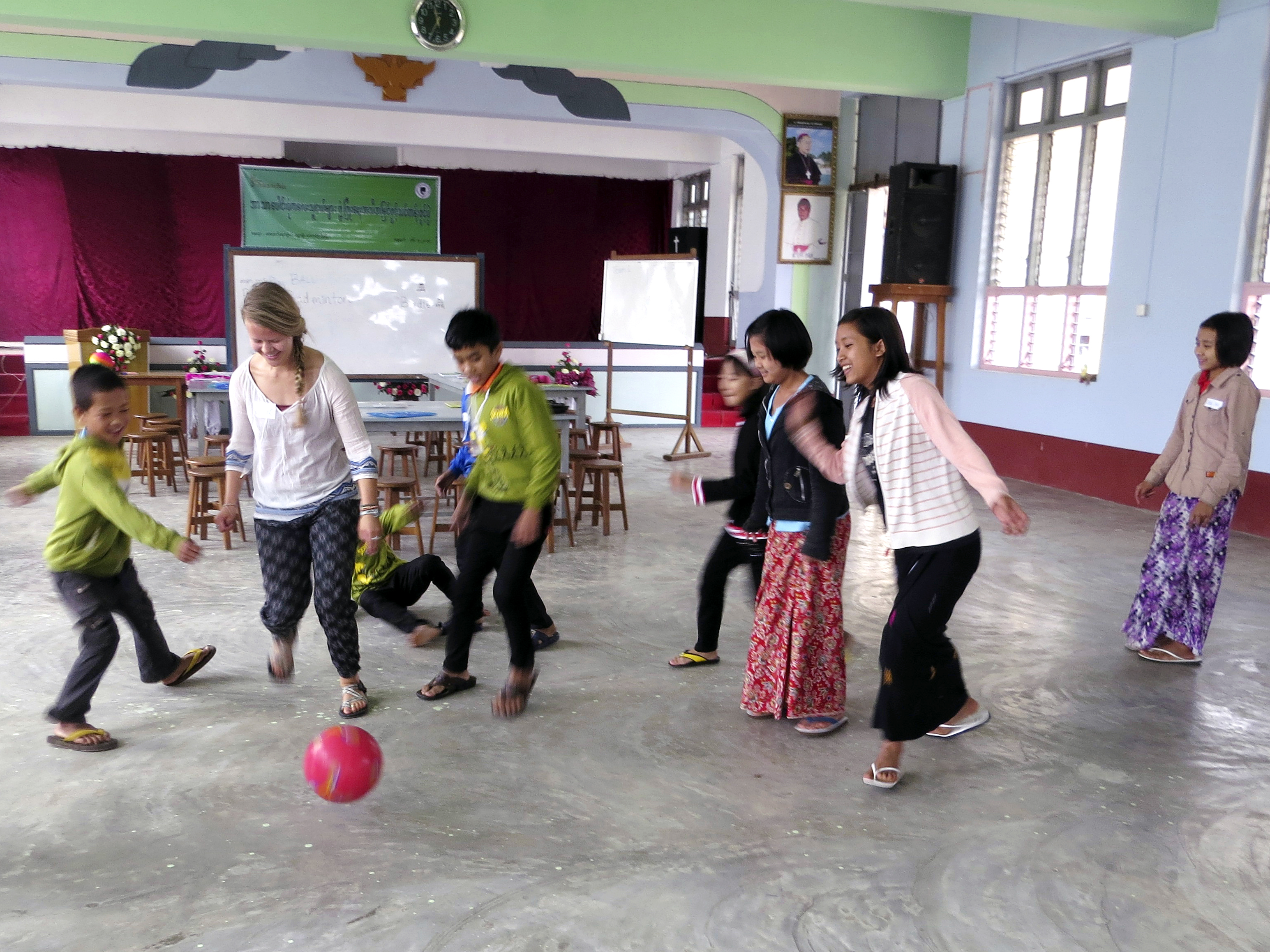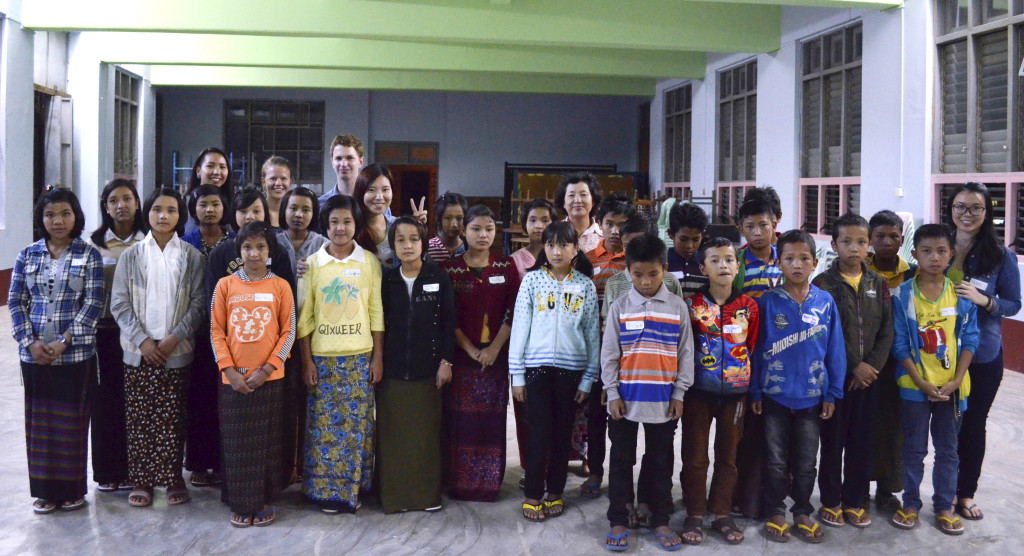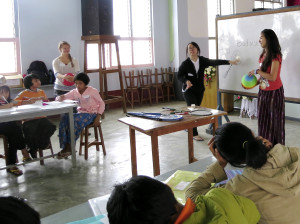
This summer, four Lewis & Clark students met in Myanmar to carry out a self-designed project. Their goal? Bring together orphaned Myanmar children from different religious backgrounds by teaching them english.
By Kaiya Gordon /// Features Editor
For five weeks this summer, Sam Shugart (’15), Nway Khine (’15), Katie Schirmer (’17) and Ira Yeap (’14) taught English to orphaned children in Myanmar through a self-designed project funded by 100 Projects for Peace. Sound intimidating? It was––but the group didn’t do it alone. Once in Myanmar, social support from the local community of Taunggyi, the city where they held their classes, helped them.
“It was interesting how everything was community based,” Schirmer said of Taunggyi. “Everything is about the community––you have to have trust.”
For the Lewis & Clark students, trust in the Myanmar community meant hitting the streets and meeting the faces of Taunggyi. In fact, Khine, a native from Taunggyi, began visiting community leaders at the end of May, and didn’t stop for weeks. “I would go to each person’s house, bring gifts, and make connections,” Khine said.
The group focused on tutoring children ages 13-18 in English, collaborating with local teachers to build the curriculum and local religious orphanages to find kids interested in the program. Because of its varying religious communities, Myanmar struggles with ethnic violence. Tension between the Buddhist majority and Muslim minority sparked violence in the city of Mandalay just weeks before the LC students journeyed to Myanmar, causing the group to reevaluate their goals and reassure partners of the project.

“My parents, throughout the program, asked me if what we were doing would make someone come and burn our house,” Khine said. “My aunt, who helped us meet leaders in Myanmar, would be the first to go to jail if anything happened.” She continued, “in order for us not to be politically involved, we had to go out and seek political leaders in my home town. We invited them to the opening ceremony and emphasized the educational aspect of our program.”
“My aunt, who helped us meet leaders in Myanmar, would be the first to go to jail if anything happened. In order for us not to be politically involved, we had to go out and seek political leaders in my home town. We invited them to the opening ceremony and emphasized the educational aspect of our program.”
Though the group hoped to build relations between children of different religious backgrounds with their program, they were unable to make that goal explicit while in Myanmar. Shirmer stressed that while their “end goal was peace building,” they “couldn’t overtly state that while in Myanmar.”
With their end goal of peace keeping in mind, the group spent long days building curriculum and teaching students, often keeping busy from 8 a.m. until late at night.

“At the beginning,” Shugart said, “we were working with a teacher from an interfaith program named Saw Han. He was very passionate about interfaith work in Myanmar––our goal, regarding interfaith, was to bring equal groups of different faiths in the classroom, and Han was awesome about connecting us to different religious leaders.” Those religious leaders, in turn, smoothed things over for the group within Taunggyi, ensuring support from the city for the project. “People were very supportive of us,” Shugart said. “Once people realized that we were there to help, they helped us out.”
The prospect of English-speaking children was economically compelling to many of the religious organizations that the group worked with, who hoped that having native English speakers would help stimulate growth in Myanmar.
To teach English, the group relied on social, academic, and kinesthetic activities to engage and motivate the students––the majority of whom had not previously received a formal education. In fact, the group’s active approach confused some of the students, who were used to very different learning expectations.
“The Myanmar education system is all about rote memorization,” Shugart explained. “The idea about teaching and building something bigger…that was hard for the kids to understand. There were some stragglers.”
Khine agreed, and noted that “because of the way that the education system is, the kids won’t really tell you when they don’t understand something. Only after activities would we know if someone was struggling.”
Even so, the students made leaps and bounds into their new language.
“Seeing students facial expressions when they understood something…that was an awesome feeling,” Shugart said. Khine said that she was particularly impressed with the kids’ enthusiasm and willingness to try new things. “At the end of the program,” said Khine, “they weren’t really at a comprehension level to speak English, but they did it anyway.”
At a closing ceremony for the project, students performed speeches, dances and songs in front of a crowd. “We didn’t do anything to train them!” Khine said. “We just asked them what they needed. I was so proud––at first they were really shy to talk in front of the whole class…but at the closing ceremony, they performed in front of about 100 people.”
“All the kids were incredibly respectful and eager,” agreed Schirmer. “They all looked out for one another.”
Though the LC students continued to stress the educational aspect of the project to leaders in Myanmar, they were happy with the social progress that the kids made. “Towards the end of the program,” Shirmer said, “the kids had no barriers in the classroom.”
“Towards the end of the program, the kids had no barriers in the classroom.”
To have Hindus, Buddhists, Christians and Muslims interacting in Myanmar is no small feat, but to achieve the collaborative learning community that Schirmer, Shugart, Khine and Yeap did in five weeks is nothing short of amazing.
The group was able to secure funding for their project through 100 Projects for Peace, an initiative aimed at students who who need money to carry out international peace-building programs of their own design. On Sept. 24, Schirmer, Shugart and Khine will present their project for LC, and answer any questions that students have about subsequent projects. “We’re also more than willing to sit down with anyone and help them through this program,” Shugart said. “There’s no real support system for this––it’s kind of your group against the world.”
But working to implement such a project opens up windows as well. One of the group’s last lessons was a field trip to Inle, a lake in Myanmar. The leaders brought their students to the lake to learn about sustainable fishing, and to practice technical vocabulary about the lake. Then they asked the students to present in front of the class.
“That trip was the culmination of a lot of the program,” Shugart said. “Having kids ask questions about the world, in English––it was really cool to see.”
[divider]
To learn more about the Myanmar project and how to submit a 100 Projects for Peace grant, attend an information session hosted by the group this Wednesday, September 24th, at 7:30PM in Miller 102.
Kaiya Gordon is the Features Editor of the Pioneer Log. She likes to write stories about pertinent on-campus events, conduct interviews, and talk about food. Kaiya’s work has been featured in the English Department’s newsletter at Lewis & Clark, at NUCL 2014, and through her internships at Mission Community Market in SF and Immigrant Law Group in Portland. Check out more of her writing on her blog and follow her @aiyakay
Subscribe to the Mossy Log Newsletter
Stay up to date with the goings-on at Lewis & Clark! Get the top stories or your favorite section delivered to your inbox whenever we release a new issue.

Leave a Reply